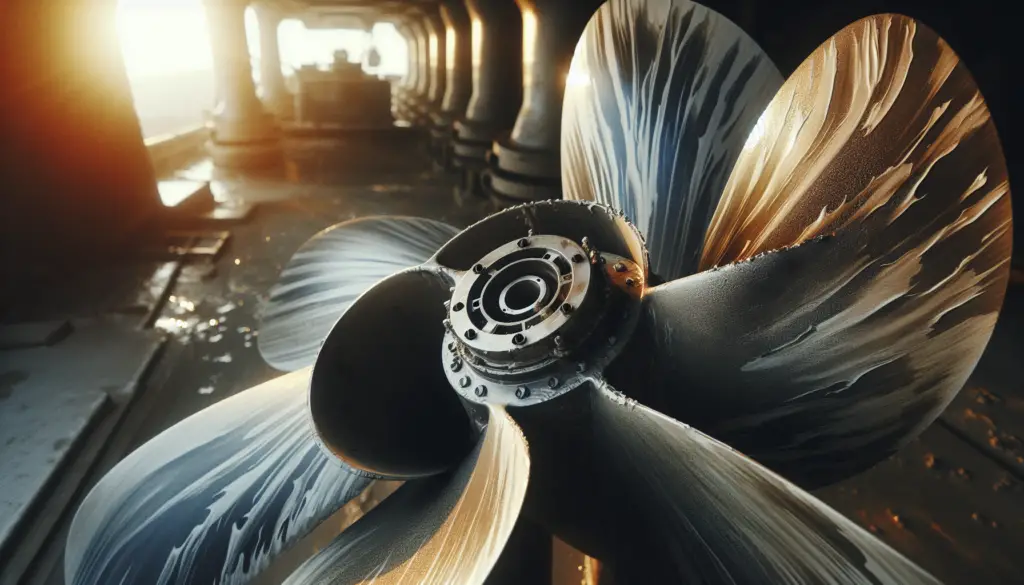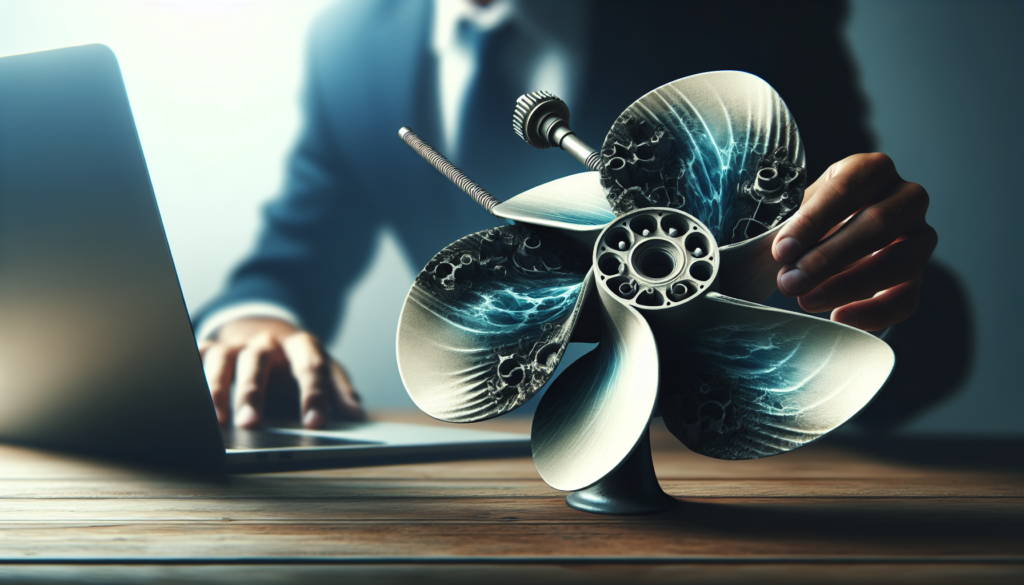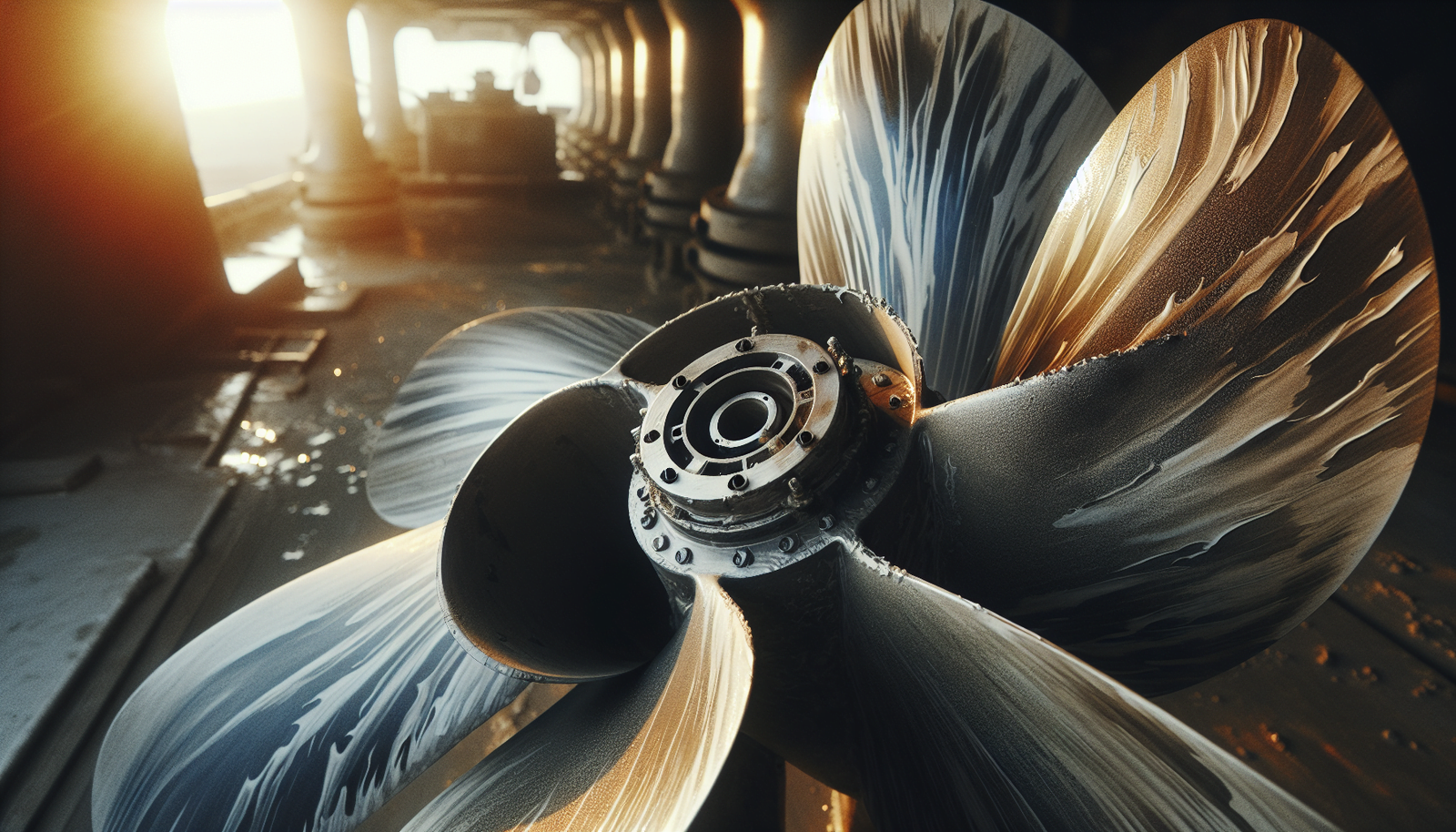Navigating through the world of boating can often seem like a breeze until you face challenging issues such as boat engine propeller problems. In this enlightening article, “Understanding Boat Engine Propeller Issues”, you will gain valuable insights into identifying and troubleshooting common propeller issues that boat owners frequently encounter. It’s designed to make your navigation smoother, as you’ll be equipped with the knowledge to address these often daunting mechanical hitches all by yourself. So gear up and let’s embark on this intriguing journey into the nitty-gritty of boat propellers. Let’s set sail!

Fundamentals of Boat Engine Propellers
Boat engine propellers are the heart of your water vessel. They produce the momentum needed to move the boat through the water. In this section, we will explore some of the basics aspects involved in boat propellers, the different types, and how they function.
Understanding the Basics of Propellers
The propeller, or “prop” as it might be referred to, is the main component that moves your boat forward. It works by converting the engine’s power into a thrust, which propels the boat into the water. The propeller does this by spinning a set of blades around a central hub which generates water pressure.
Types of Boat Propellers
The design and type of boat propellers largely depend on the purpose of the boat. The most common types are the three-blade, four-blade, and five-blade propellers. The three-blade propeller is the most common due to its balance of performance and efficiency. Four-blade propellers offer better acceleration and stability, while five-blade propellers are mostly used on high-performance boats.
How Propellers Function
The essential function of a propeller is to convert the rotational energy from the boat’s engine into linear motion. This is accomplished by the blades of the propeller pushing water backwards, providing a forward thrust that propels the boat forward.
Common Boat Engine Propeller Issues
Despite their simplicity, propellers can develop a range of problems that can impair your boat’s performance. In this section, we will discuss some of the most common propeller issues and their causes including vibration, speed performance, cavitation, and ventilation.
Introduction to Common Problems
The most common propeller problems that are often encountered include vibration issues, speed performance problems, cavitation, ventilation, and physical damage. Each of these results from different factors and has a range of solutions.
Vibration Issues
Vibration issues in propellers are usually due to an imbalance in the propeller’s blades. This could be a result of damage, an improperly mounted propeller or a propeller that is not in synchrony with the boat’s engine.
Speed Performance Problems
Speed performance issues can be frustrating and are often a result of selecting the wrong type of propeller for your boat, incorrect pitch angle, or damage to the propeller blades.
Cavitation Problems
Cavitation is a common problem that is caused when bubbles form on the propeller’s surface due to drastic pressure drops. When these bubbles collapse, they can cause pitting and damage to the propeller blades.
Ventilation Issues
Ventilation occurs when air is drawn down from the water’s surface into the propeller blades. This can lead to engine over-revving as the propeller loses its grip on the water.
Vibration Problems in Propellers
Excess vibration in your boat can be annoying and detrimental. In this section, we’ll delve into how you can identify and solve vibration problems.
Identifying Vibration Problems
Vibration problems can manifest in multiple ways. You may feel an abnormal shake in the steering wheel, or hear noises when at certain speeds. Prolonged, unaddressed vibration can lead to wear and damage to the boat’s mechanical structures.
Causes of Propeller Vibration
The most common cause of propeller vibration is damage or imbalance in the propeller itself. This could be due to bent blades, incorrect pitch angles, or improper mounting. Other causes might include engine misalignment or issue with the drive shaft.
Solutions to Vibration Problems
Addressing vibration problems depends on accurately determining the cause. Regular maintenance and careful monitoring of your boat can help identify and resolve vibration issues before they become severe.

Issues tied to Propeller Speed Performance
Optimizing your boat’s speed is important for a smooth sailing experience. Let’s examine the issues tied to speed performance and the potential solutions.
Identifying Speed Performance Issues
If your boat isn’t reaching the top speed you know it’s capable of, or is consuming fuel quickly, it’s possible you have a speed performance issue. The boat may also fail to plane or accelerate poorly.
Factors that Affect Propeller Speed
Various factors can affect your propeller’s speed. These include the type and size of the propeller, the pitch and rake of the blades, and the weight and hull design of the boat. Equipment malfunctions or physical damage to the propeller can also contribute.
Solutions to Speed Issues
Solving speed performance issues can involve a range of solutions such as repairing or replacing a damaged propeller, adjusting the pitch angle, or selecting a propeller that better suits the boat and its intended usage.
Understanding Propeller Cavitation Problems
Cavitation in propellers is a complex issue, but we’ll try to break it down.
Concept of Cavitation in Propellers
Cavitation occurs when the pressure around the propeller drops drastically, leading to vapor-filled bubbles on its surface. When these bubbles collapse, they cause shock waves that can damage the propeller’s surface.
Identifying Propeller Cavitation
Cavitation often presents as pitting or erosion on the surface of the propeller blades. You may experience unusual noises or vibrations, and a reduce in your boat’s performance and speed.
Preventing and Resolving Cavitation Issues
Preventing cavitation is usually a matter of choosing the right propeller that is designed to minimize pressure drops. Resolving existing cavitation issues may require repairing or replacing the propeller, or adjusting the boat’s trim and thrust.
Propeller Ventilation Issues and Solutions
Next, let’s cover what happens when your propeller starts drawing air from the surface of the water.
Defining Ventilation in Propellers
Ventilation occurs when a propeller near the surface sucks in air or exhaust gases, causing it to spin in a mixture of water and air instead of just water.
How to Identify Ventilation
If your boat is not accelerating as usual or it seems the engine is over-revving, you might be experiencing ventilation issues. You might also experience a sudden loss of thrust, especially at high speeds.
Ways to Remedy Ventilation Problems
Reducing ventilation can be as simple as adjusting your trim, slowing down your speed, or ensuring your load is evenly distributed. Sometimes, adjusting or replacing your propeller is necessary.
Physical Damage to Propellers
Physical damage can greatly affect your propeller’s performance. Let’s take a look at common damage types and how to deal with them.
Common Types of Physical Damage
The most common types of propeller damage include bent or broken blades,damage to the hub or other components, and general wear and tear.
Identifying Physical Damage
Damage to the propeller can be visible upon inspection. A change in the boat’s performance, vibrations, or unusual sounds can also be indicators.
Effects of Physical Damage
Physical damage not only affects your propeller’s performance, it can lead to other problems such as engine strain, increased fuel consumption, and even accidents.
Repairing and Maintaining Physical Damage in Propellers
Physical damages should be repaired immediately to prevent further damage. Depending on the extent of the damage, professional repair or replacement might be needed. Regular inspection can also aid in preventing such damages.
Evaluating Propeller Efficiency
The efficiency of your propeller is key to a smooth sailing experience. Here’s how to ensure your propeller is operating at its most efficient.
Factors that Influence Propeller Efficiency
Propeller efficiency is largely determined by its design, size and pitch. The condition of the propeller, the speed of the boat, and the load also impact efficiency.
Assessing Propeller Efficiency
To assess propeller efficiency, you should be monitoring the boat’s speed, fuel consumption, vibrations and noise, as well as inspect the propeller regularly for signs of damage or wear.
Improving Propeller Efficiency
Improving propeller efficiency starts with choosing the right propeller for your boat. Regular maintenance also plays a big role in ensuring that your propeller is not underperforming due to physical damages or malfunctions.
Role of Maintenance in Preventing Propeller Issues
Maintenance is the easiest and most cost-effective way to prevent most propeller issues. Let’s delve into the importance of regular maintenance.
Importance of Regular Maintenance
Regular maintenance helps identify any upcoming issues before they turn into serious problems. It is fundamental in prolonging the life of your propeller and ensuring maximum efficiency.
Maintenance Tips for Propellers
Some basic tips for maintaining your propellers include regular inspection for visible damages, ensuring the propeller is mounted correctly, cleaning to remove any build-up, and routine servicing by professionals.
Effects of Poor Maintenance
Poor maintenance can lead to a range of issues like abnormal vibrations, reduced speed, fuel inefficiency and even severe damages. It could also negatively impact the longevity of your propeller.
Understanding the Link between Propeller Issues and Boat Engine Health
Lastly, let’s look at how propeller issues can also be a sign of problems with the boat’s main engine.
How Propeller Issues Affect the Main Engine
Problems with the propeller can strain the boat’s engine, causing it to overwork and overheat. This, in turn, can lead to high fuel consumption, reduced engine lifespan, and potential engine failure.
Signs of Engine Damage Due to Propeller Problems
Some signs of engine damage due to propeller issues may include unusual noise, excess smoke, decrease in the engine’s power, overheating and abnormal fuel usage.
Preventing Engine Problems through Propeller Upkeep
Regular maintenance of the propeller can help prevent engine problems. This can include tuning, cleaning, and repairing or replacing the propeller. Following proper operation procedures and guidelines can also minimize the wear and tear on both the engine and the propeller.
Propellers are an integral part of a boat’s operation, and knowing how to tend to them is essential for boat ownership. By understanding the possible issues and their solutions, you can ensure that your boat functions smoothly and enjoys a long lifespan. Responsible propeller and overall boat maintenance is more than just a duty, it’s a sign of a dedicated boat owner.

